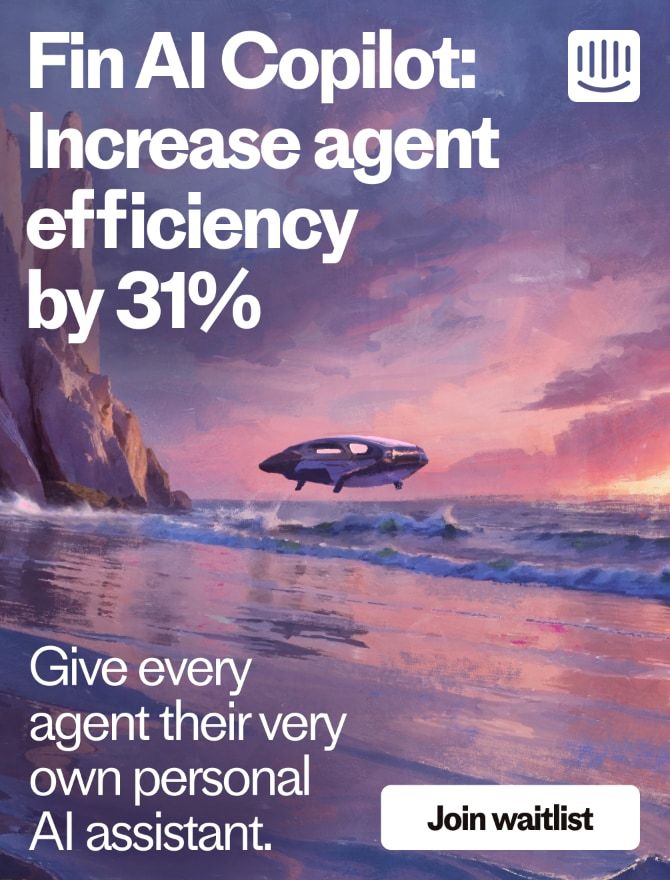Crossing the threshold: Exploring Intercom’s Customer Service Trends Report for 2024
Generative AI is transforming customer service faster than any other field, and we’re only just beginning to grapple with the implications for customer service.
We’ve just published The Intercom Customer Service Trends Report for 2024, surveying more than 2,000 customer service professionals across a range of locations, roles, and company sizes to take the temperature of the industry at this critical moment.
🎟️ Welcome to the The Ticket podcast, featuring conversations with the customer service leaders and CX thinkers who are shaping the future of support.
You can follow on Apple Podcasts, Spotify, YouTube or grab the RSS feed in your player of choice.
The report is a fascinating snapshot of the prevailing attitudes among customer service teams. In this inaugural episode of The Ticket podcast, three of our customer support leaders here at Intercom discuss the findings and explore the implications of these key trends.
Bobby Stapleton, our Director of Human Support, hosts this fascinating conversation with Declan Ivory, our VP of Customer Support, and Anthony Lopez, our Director of Customer Support Operations, in which they explore the survey results and shed light on the ways customer service is changing.
The extent of that change is vast. In the words of Declan, 2023 was when “all of a sudden the art of the possible … really took a leap forward in terms of the ability to apply AI to transform the customer experience and transform the way that support is delivered. The landscape for customer service is changed forever in a really positive way.”
Here are some of the key takeaways from the conversation.
Rising customer expectations
Now that customers know how AI can improve their support experience, they’re not willing to wait around for anything less. Customer expectations for customer service have reached an all-time high, with 87% of support teams reporting that customer service expectations have increased in the past year.
“Having a really high-quality chatbot that’s available 24/7 is possible, and it’s easy”
Anthony notes that the availability of high-quality chatbots has contributed to this increase. “Having a really high-quality chatbot that’s available 24/7 is possible, and it’s easy. The barrier of entry is so much lower … Of course, if for the last 10 months you’ve been getting responses in less than 30 seconds and you see a company that’s not doing that, then you’re going to have a miscalibration there with your expectations.”
AI adoption in customer service
Almost half of customer support teams are already using AI, and that trend is set to continue upwards, with 70% of C-level support execs planning to invest in AI for customer service in 2024. That trajectory is reflected in the experiences of the team, as Bobby and Declan point out.
“To think back to January of last year, I remember all of us sitting around in Dublin thinking about how we wanted to improve our own bot experience,” says Bobby. “It’s just wild to me to think about … how we were envisioning customer expectations, how quickly that changed from January of last year to now.”
“We’ve crossed the threshold in 2023”
The increasing speed of adoption that the survey reveals is highlighted by Declan.
“Look at the acceleration, like 70% of leaders saying they’re going to invest in 2024,” he says. “This is really accelerating and people are beginning to see the benefits. So while there might have been some hesitancy at the start … people are really beginning to see, yes, it is a high-quality technology. When you integrate it and complement your human support team with this technology, you are delivering a really compelling experience for customers. I think we’ve crossed the threshold in 2023.”
Support teams and AI
The report suggests that customer service professionals are well aware that AI is going to change the nature of their work in fundamental ways, with many new opportunities arising out of the transition.
“CS roles will change, no doubt about that, but new roles will appear as well”
“I think the nature of the role is changing quite a bit. It’s scientific,” Declan suggests. “It’s not just about answering the question for the customer as it comes through, but it’s also around making sure that you’re supporting the evolution of AI, like feeding the knowledge back into the AI ecosystem. That’s a big part of the role now.
“CS roles will change, no doubt about that, but new roles will appear as well. So we’ve talked about things like conversation designers, conversation analysts, etc. They’re all new roles or new responsibilities that are going to happen in support.”
Tech stack evolution
Last-generation tools aren’t going to cut it in this new age of customer service, which is why 65% of C-level support execs are looking at new platforms, tools, and technology specifically as a result of AI.
“I would bring together all these different individual pieces of technology into a Frankenstein of sorts”
As Anthony points out, only 18% of customer service professionals think that their existing tech stack covers everything they need in order to fully support their customers. There are too many tools that don’t integrate seamlessly enough to provide a quality experience for customers. This reinforces the need for integrated CS platforms with AI at their core.
“Five years ago, I was always the type of person who would bring together all these different individual pieces of technology into a Frankenstein of sorts,” says Anthony. “I think all-in-one platforms are so much more important now.”
Changing metrics with AI
Old metrics won’t help you meet new opportunities, so support teams need to redefine how they measure and report on core metrics and KPIs to get a true measure of value and success.
Declan emphasizes how fundamentally the existing methods of measuring customer service will have to change. “Support leaders need to think differently about metrics when it comes to looking at the economics of support,” he says. “It’s not just about the economics of resolving the issues and humans interfacing with customers.”
“You have these tools that can take those conversations and really summarize them and understand them”
As AI resolves the simple queries almost instantly, human agents will have more time to dive deep into their customers’ problems without worrying about an overwhelming inbox. For instance, Declan suggests “Average handle times change in this world … You may actually want your average handle time to increase and you may celebrate it, whereas in the past you’d always celebrate driving down average handle time.”
From a customer support operations perspective, the shift here is not just about the quantitative reporting, but the qualitative insights that AI can surface.
“What I love about this new AI wave is that … there’s a really qualitative aspect of understanding your experience,” says Anthony. “It’s not just, ‘Did I respond within 30 minutes? Was I empathetic? Was I caring? Did I actually go above and beyond to solve your problem?’ And it was really difficult to measure that in the past with data. But now that you have these tools that can take those conversations and really summarize them and understand them, true understanding, it’s a lot more easy to measure at scale.”
If you enjoy our discussion, check out more episodes of our podcast. You can follow on Apple Podcasts, Spotify, YouTube or grab the RSS feed in your player of choice.








